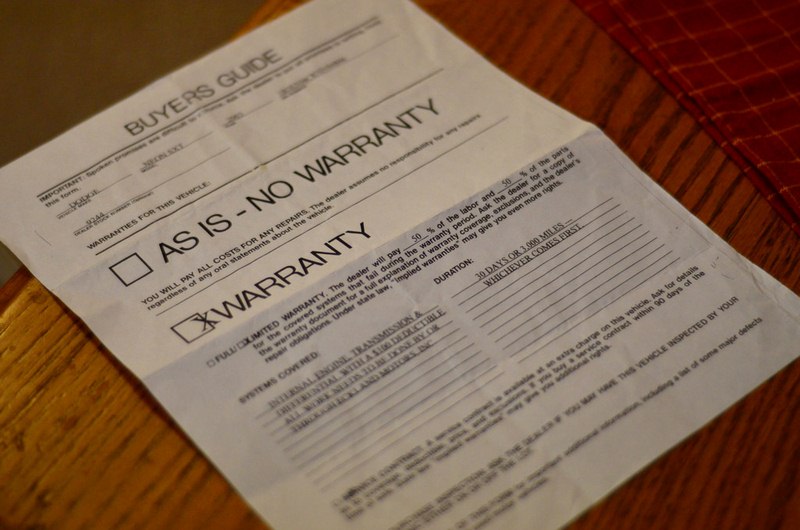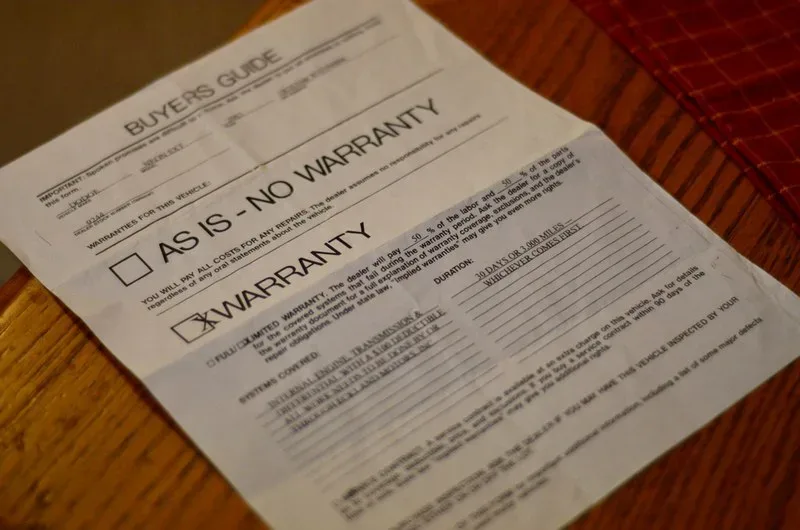Walk into any big-box retailer and attempt to buy just about anything and you will quickly be offered an extended warranty, replacement agreement or service contract.
Consumer Reports and various other consumer groups would have you believe that these extended warranties are nothing but a scam to separate more of your hard earned money from your pocketbook, but this is not altogether true.

The Consumers Guide to Extended Warranties
The aim of this article is to give you the basic facts needed to make an educated and informed decision.
The Good
These extended warranties can be a blessing for many consumers. Think of it as cheap insurance (although the retailers will swear up and down that it is not insurance for legal reasons) for your medium to larger purchases.
In the case of service agreements, repairs are often done in your home and parts and labor are included. Often they will include yearly maintenance checks to keep your equipment in tip-top shape before there is a problem.
If you are not mechanically inclined and don’t relish the idea of paying for part and or labor charges (which start at about $70 an hour) or having to replace the item altogether, then a service agreement is in your best interests.
Replacement agreements are usually offered on low to middle-end electronic items. The benefit of these agreements is that if there is a problem with the item, the retailer will replace it for free with a brand new one and they usually cover the item for one to two years.
If you find yourself buying the same item over and over again due to breakage (for me it’s the computer headphone/microphone headset) purchase a replacement agreement and be done with it. This can save you an awful lot of money in the long run.
Most of the better service agreements include a “lemon” clause. If you have the same item worked on for the same problem three or more times, they will usually replace the item with a spanking new one.
The Bad
Extended Warranties are about 90% profit for the retailer. They are betting that you won’t be one of the 10% of users who actually encounter a problem with the item involved during the warranty coverage period. What this basically means is that most of the time you will never have a need to use the warranty you purchased, and it does become just a waste of money.
Many items are not repaired in the home. Some good examples would be push lawn mowers, compressors, power tools, and smaller televisions. This means you will have to take the item in to be serviced and often have to wait for one to two weeks or more for the item to be sent out to a repair center and then returned before you can pick it up and actually use it again.
In the case of a lawn mower, you (and your neighbors) might not be too happy about the wait. If you are mechanically inclined, you can often make simple repairs yourself, for just the cost of parts and not have to deal with the wait.
In regards to electronic items and the replacement agreements that come with them, most electronics will fail in the first 90 days of use if they are going to fail at all. So in many cases, the replacement agreement is a “rip-off” for the consumer.
Tips
Read the agreements carefully or make sure the agreements are explained well. Often times you will find out that many things are not covered, such as throw-away parts (filters, belts, spark plugs, batteries, hoses, etc) and abuse, or more specifically what the company considers to be abuse, or abusive.
Always check to see if the extended warranty runs in concurrence with the manufacturer’s warranty, or if it starts after the manufacturers’ warranty ends. There is little point in buying a replacement agreement of the same length as the basic manufacturers’ warranty unless there are a lot of extra things covered or thrown in.
Do Your Research
Before buying anything check, or ask the salesperson involved about what kind of maintenance is needed, and what if anything is likely to go wrong with it. If you take the example of a treadmill, most people don’t know that the belts that you walk on usually have to be replaced once a year or so depending of course on the amount of use it receives.
Belts usually cost around $100, which does not include either replacing it yourself or paying for the labor and trip charge of having someone come out to do it for you. When all is said and done one can easily spend $250 to replace one belt, or you can spend $300 when you buy the machine and have everything covered for 5 years.
In this case, a service agreement is worth buying, obviously as the cost of replacement parts alone is worth more than the cost of the 5-year agreement to replace those parts.
If there is a motor involved or lots of moving parts, it is usually worth getting the extended warranty if it is not too outrageously priced. The cost to repair motors can be very expensive and it is usually cheaper just to buy a new item altogether unless you have an extended warranty protecting your investment.
For the love of all that is good and pure, keep the paperwork and put it somewhere that you can easily find it; after a year or so many retailers may not be able to look up your agreement in their system. If you cannot provide proof that you purchased and do indeed have a valid extended warranty it probably will not be honored by the retailer.
The Bottom Line
Extended warranties are both good and bad and it largely depends on the item in question, what is and is not covered and the mechanical savvy of the person involved who is buying it.
My own personal experiences with them have been very good as they have saved me a great deal of money. That being said, I almost never buy one on an electronics item unless it is something that I break often or a big ticket item like a television or a computer that would be costly to replace outright.
One last question to leave you with that you should always ask yourself when purchasing an extended warranty: Is the cost of the agreement worth your peace of mind? If the answer is yes, buy it and don’t look back. Caveat Emptor.










